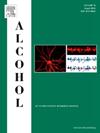Assessment of reduction in stimulus generalization of ethanol-seeking during recovery: A rapid procedure
IF 2.9
4区 医学
Q3 PHARMACOLOGY & PHARMACY
引用次数: 0
Abstract
Previously, we developed a procedure which showed that longer histories of reinforced alternative behavior decrease the risk of relapse caused by a range of stimuli which had previously occasioned drinking. The decrease in relapse risk was likely due to a decrease in attention to the stimuli over the course of repeated engagement in the alternative behavior. However, this previous procedure was time consuming and did not mirror the procedure we used to observe changes in relapse risk. This study aimed at replicating the previous relationship between the duration of engaging in an alternative behavior and shift in stimulus generalization for drinking using a procedure that allows longitudinal analysis over time and is consistent with other procedures we have developed. Rats were trained to respond for ethanol in the presence of one stimulus (16 kHz tone; food Fixed Ratio (FR)150 and ethanol FR5), and for food in the under another stimulus (8 kHz tone; food and ethanol FR5). Then, recovery-like sessions with food predominant responding occurred in the presence of only the low-cost food stimulus. During these sessions, rats were exposed to non-reinforced graded stimuli alternation from 8 to 16 kHz alternating with the reinforced low-cost food stimulus. The number of responses on each (food and ethanol) lever before completing 5 responses on either lever was the main measure. Consistent with the earlier procedure, the current procedure showed that graded variation of tone from 8 to 16 kHz produced a graded increase in responding for ethanol compared to responding for food. In addition, longer periods of engaging in recovery-like responding shift the generalization function downwards. This procedure confirms the earlier pattern of stimulus generalization over longer periods of behavior consistent with recovery. This strengthens our hypothesis that shifts in attention to alcohol-related stimuli are important to the development of relapse resistance during recovery.
评估恢复期乙醇觅食刺激泛化的减少:快速程序。
在此之前,我们开发了一种程序,该程序表明,如果替代行为的强化时间较长,那么之前导致饮酒的一系列刺激所引起的复发风险就会降低。复吸风险的降低可能是由于在反复参与替代行为的过程中,对刺激的注意力有所下降。然而,以前的这一程序耗时较长,与我们观察复饮风险变化的程序并不一致。本研究旨在复制之前的替代行为持续时间与饮酒刺激泛化转变之间的关系,使用的程序允许随着时间的推移进行纵向分析,并且与我们开发的其他程序一致。训练大鼠在一种刺激(16kHz 音调;食物固定比率(FR)150 和乙醇 FR5)下对乙醇做出反应,在另一种刺激(8kHz 音调;食物和乙醇 FR5)下对食物做出反应。然后,在仅有低成本食物刺激的情况下,大鼠会做出以食物为主的恢复性反应。在这些环节中,大鼠暴露于从 8 到 16 千赫兹的非强化分级刺激中,与强化的低成本食物刺激交替出现。主要测量大鼠在每个(食物和乙醇)杠杆上完成 5 次反应之前在任一杠杆上的反应次数。与之前的程序一致,目前的程序显示,与对食物的反应相比,从 8 到 16kHz 的音调分级变化会分级增加对乙醇的反应。此外,较长时间的恢复反应会使泛化功能向下移动。这一过程证实了之前的模式,即刺激泛化在较长时间的行为中与恢复一致。这加强了我们的假设,即对酒精相关刺激的注意力转移对恢复期抗复吸能力的发展非常重要。
本文章由计算机程序翻译,如有差异,请以英文原文为准。
求助全文
约1分钟内获得全文
求助全文
来源期刊

Alcohol
医学-毒理学
CiteScore
4.60
自引率
4.30%
发文量
74
审稿时长
15.6 weeks
期刊介绍:
Alcohol is an international, peer-reviewed journal that is devoted to publishing multi-disciplinary biomedical research on all aspects of the actions or effects of alcohol on the nervous system or on other organ systems. Emphasis is given to studies into the causes and consequences of alcohol abuse and alcoholism, and biomedical aspects of diagnosis, etiology, treatment or prevention of alcohol-related health effects.
Intended for both research scientists and practicing clinicians, the journal publishes original research on the neurobiological, neurobehavioral, and pathophysiological processes associated with alcohol drinking, alcohol abuse, alcohol-seeking behavior, tolerance, dependence, withdrawal, protracted abstinence, and relapse. In addition, the journal reports studies on the effects alcohol on brain mechanisms of neuroplasticity over the life span, biological factors associated with adolescent alcohol abuse, pharmacotherapeutic strategies in the treatment of alcoholism, biological and biochemical markers of alcohol abuse and alcoholism, pathological effects of uncontrolled drinking, biomedical and molecular factors in the effects on liver, immune system, and other organ systems, and biomedical aspects of fetal alcohol spectrum disorder including mechanisms of damage, diagnosis and early detection, treatment, and prevention. Articles are published from all levels of biomedical inquiry, including the following: molecular and cellular studies of alcohol''s actions in vitro and in vivo; animal model studies of genetic, pharmacological, behavioral, developmental or pathophysiological aspects of alcohol; human studies of genetic, behavioral, cognitive, neuroimaging, or pathological aspects of alcohol drinking; clinical studies of diagnosis (including dual diagnosis), treatment, prevention, and epidemiology. The journal will publish 9 issues per year; the accepted abbreviation for Alcohol for bibliographic citation is Alcohol.
 求助内容:
求助内容: 应助结果提醒方式:
应助结果提醒方式:


